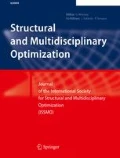Abstract
In some cases, topology optimization of continuum structures subjected to applied loads having a zero resultant force may result in an unpractical design without support. This phenomenon occurs because the original optimization problem neglects the possible change of the direction of applied load. This brief note sheds the light on avoiding such an unpractical design from the engineering viewpoint. In our work, this usually neglected phenomenon is systematically illustrated by employing a series of two-dimensional (2D) cantilever design problems using a simple and efficient Bi-directional Evolutionary Structural Optimization (BESO) method. An alternative scheme is further recommended to tackle the concerned conundrum. The proposed scheme not only can avoid unpractical designs without any support, but also takes into account the inherent uncertainty property in designing actual engineering structures.








References
Allaire G, Jouve F, Toader AM (2004) Structural optimization using sensitivity analysis and a level-set method. J Comput Phys 194(1):363–393
Bendsøe MP, Kikuchi N (1988)Generating optimal topologies in structural design using a homogenization method. Comput Methods Appl Mech Eng 71(2):197–224
Bendsøe MP, Sigmund O (1999) Material interpolation schemes in topology optimization. Arch Appl Mech 69(9–10):635–654
Csébfalvi A (2017a) Robust topology optimization: a new algorithm for volume-constrained expected compliance minimization with probabilistic loading directions using exact analytical objective and gradient. Period Polytech Civ 61(1):154–163
Csébfalvi A (2017b) Structural optimization under uncertainty in loading directions: benchmark results. Adv Eng Softw In press. doi:10.1016/j.advengsoft.2016.02.006
Csébfalvi A, Lógó J (2015) Critical examination of volume-constrained topology optimization for uncertain load magnitude and direction. In: Proc of ICCSEEC 15. Civil-comp press, Stirlingshire, UK
Dunning PD, Kim HA (2013) Robust topology optimization: minimization of expected and variance of compliance. AIAA J 51(11):2656–2664
Dunning PD, Kim HA, Mullineux G (2011) Introducing loading uncertainty in topology optimization. AIAA J 49(4):760–768
Huang X, Xie YM (2007) Convergent and mesh-independent solutions for the bi-directional evolutionary structural optimization method. Finite Elem Anal Des 43(14):1039–1049
Huang X, Xie YM (2008a) A new look at ESO and BESO optimization methods. Struct Multidiscip Optim 35(1):89–92
Huang X, Xie YM (2008b) Optimal design of periodic structures using evolutionary topology optimization. Struct Multidiscip Optim 36(6):597–606
Huang X, Xie YM (2009) Bi-directional evolutionary topology optimization of continuum structures with one or multiple materials. Comput Mech 43(3):393–401
Jantos DR, Junker P, Hackl K (2016) An evolutionary topology optimization approach with variationally controlled growth. Comput Methods Appl Mech Eng 310:780–801
Junker P, Hackl K (2015) A variational growth approach to topology optimization. Struct Multidiscip Optim 52(2):293–304
Junker P, Hackl K (2016) A discontinuous phase field approach to variational growth-based topology optimization. Struct Multidiscip Optim 54(1):81–94
Liu K, Tovar A (2014) An efficient 3D topology optimization code written in Matlab. Struct Multidiscip Optim 50(6):1175–1196
Liu J, Wen G., Chen X, Qing Q (2015) Topology optimization of continuum structures with uncertainty in loading direction. In: Proc of M2D, Ponta Delgada, Portugal
Liu J, Wen G, Xie YM (2016) Layout optimization of continuum structures considering the probabilistic and fuzzy directional uncertainty of applied loads based on the cloud model. Struct Multidiscip Optim 53(1):81–100
Liu J, Wen G, Qing Q, Xie YM (2017) An efficient method for topology optimization of continuum structures in presence of uncertainty in loading direction. Int J Comp Meth 14(5):1750054-1-1750054-23
Lógó J, Ghaemi M, Rad MM (2009) Optimal topologies in case of probabilistic loading: the influence of load correlation. Mech Based Des Struc 37(3):327–348
Sigmund O (2001) A 99 line topology optimization code written in Matlab. Struct Multidiscip Optim 21(2):120–127
Suzuki K, Kikuchi N (1991) A homogenization method for shape and topology optimization. Comput Methods Appl Mech Eng 71(2):197–224
Wang MY, Wang X, Guo D (2003) A level set method for structural topology optimization. Comput Methods Appl Mech Eng 192(1):227–246
Xie YM, Steven GP (1993) A simple evolutionary procedure for structural optimization. Comput Struct 49(5):885–896
Zuo ZH, Xie YM (2015) A simple and compact python code for complex 3D topology optimization. Adv Eng Softw 85:1–11
Zuo ZH, Xie YM, Huang X (2009) Combining genetic algorithms with BESO for topology optimization. Struct Multidiscip Optim 38(5):511–523
Acknowledgements
The first author is partially supported by the scholarship No. 201506130053 of China Scholarship Council. This work was supported jointly by the project of “Chair Professor of Lotus Scholars Program” in Hunan province, the National Natural Science Foundation of China (No. 11672104) and the National Science Fund for Distinguished Young Scholars in China (No. 11225212). The authors also would like to thank the support from the Collaborative Innovation Center of Intelligent New Energy Vehicle, and the Hunan Collaborative Innovation Center for Green Car.
Author information
Authors and Affiliations
Corresponding author
Rights and permissions
About this article
Cite this article
Liu, J., Wen, G. & Huang, X. To avoid unpractical optimal design without support. Struct Multidisc Optim 56, 1589–1595 (2017). https://doi.org/10.1007/s00158-017-1720-6
Received:
Revised:
Accepted:
Published:
Issue Date:
DOI: https://doi.org/10.1007/s00158-017-1720-6

